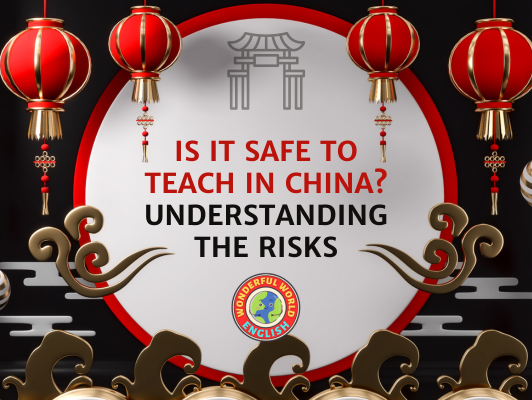Contents
Toggle
Meet David De’ Ath, founder, editor, and writer at Wonderful World English. With his extensive background as an English teacher, David provides valuable insights and practical tips on ESL for students and teachers alike.
Safety considerations are an essential factor for educators contemplating a move to teach in China.
With China’s expanding international presence and cultural influence, teaching there holds great potential for professional growth and cultural immersion.
Yet, safety concerns are natural when relocating to any foreign country.
Educators eyeing China for teaching must grasp its educational system, legal requirements, and cultural norms for a secure experience. Preparation is key to navigating safety, legalities, and societal adjustments. While China offers professional and cultural growth, understanding local dynamics is crucial for a rewarding tenure.
China, as one of the most populous nations with diverse cultural practices and a unique legal system, requires a thorough understanding of its educational context and societal norms before making such a move.
Key Takeaways
- Educators must consider safety and legal aspects before teaching in China.
- A deep understanding of China’s educational system and regulations is essential.
- Awareness of daily life conditions in China contributes to a secure teaching experience.
Understanding the Educational Landscape in China
Before teaching in China, it’s crucial to understand the country’s multifaceted educational system, its requisite qualifications, and any cultural adjustments that may be necessary.
Here’s an insightful look into what educators can anticipate:
Chinese Education System Overview
China operates the world’s largest education system, catering to over 289 million students.
In terms of structure, it comprises primary, secondary, and tertiary levels.
Foreign educators typically find opportunities in public schools, private language centers, or international schools.
Types of Schools for Foreign Teachers
Foreign teachers in China can work in a variety of educational institutions:
- Public Schools: They offer stable hours and a chance to experience traditional Chinese education.
- Private Schools: These often provide more competitive salaries and smaller class sizes.
- International Schools: They cater to expatriates and follow international curricula, requiring teachers often to have higher qualifications.
Qualifications and Requirements for Teaching
To teach in China, one generally needs:
- A Bachelor’s Degree in any discipline.
- A TEFL Certificate or other teaching credentials such as TESOL or CELTA.
- Relevant teaching experience—usually at least two years.
Acquiring a Work Visa (Z Visa) for Teaching
Obtaining a Z Visa is a critical step for legally teaching in China. The process involves:
- Job Offer: From a registered Chinese school.
- Documentation: Including a valid passport, TEFL certification, degree, and medical check-up results.
- Application: Submission through a Chinese embassy or consulate.
Cultural Norms and Adjusting to the Local Environment
Embracing Chinese culture is a significant part of the transition.
Culture shock can be mitigated by understanding local laws, societal norms, and educational expectations.
Building relationships with the community is also highly beneficial.
Language Barrier and Communication
While Mandarin is the official language, many schools offer English as a second language.
However, foreign teachers should consider learning basic Mandarin to ease everyday communication and foster a deeper connection with the community.
For a complete guide on TEFL certificates, check out the link below!
Related: TEFL Certificates: Your Guide to Teaching English Abroad

Safety, Legalities, and Daily Life in China
This section explores the aspects of safety, adherence to local laws, financial aspects of teaching, and the social integration that foreign educators face in China.
Health and Safety Concerns for Teachers
China’s major cities like Beijing and Shanghai have established a reputation for being reasonably safe, especially in terms of violent crime.
In terms of road hazards, the traffic can be chaotic, and foreigners are often advised to be cautious when navigating the streets, whether as a pedestrian or a cyclist.
Understanding Local Laws and Legal Issues
Foreign teachers must adhere to Chinese laws strictly, with drug offenses carrying particularly severe penalties, including deportation or even a death sentence.
It’s essential to understand the legal requirements for a work visa (Z visa) and avoid any actions that could be construed as exploitation, such as working without a proper license.
Additionally, activities on social media platforms like Facebook or Twitter may be monitored.
Thus, criticism of the government or discussion of sensitive topics like Tibet, Taiwan, and local politics may lead to serious consequences.
Salaries, Contracts, and Job Security
An average salary for an ESL teacher can vary significantly, from approximately 1,400 to 2,200 USD monthly, with jobs at private or international schools potentially offering up to 4,300 USD.
Contracts should clearly outline salary, job responsibilities, and airfare reimbursement.
Educators should seek opportunities through reputable recruiters or schools and be wary of scams.
Job security hinges on both the teacher’s performance and parents’ satisfaction, as well as the ability to navigate the challenges of the classroom effectively.
Navigating Culture and Lifestyle Adjustments
Living in China presents an exciting cultural experience, from its rich history and landmarks like the Great Wall and Forbidden City to the vibrant local culture.
Expats may face a culture shock and must tread carefully to not offend local customs and traditions.
Learning basic Mandarin or investing in Chinese lessons can be incredibly beneficial.
While some cultural differences, such as restrictions on platforms like Facebook, may require some time to adjust to, many foreigners find their stint in Asia to be enriching, pushing them out of their comfort zone and providing a remarkable cultural experience.

Conclusion
In conclusion, teaching in China presents a unique and enriching opportunity for educators, offering both professional growth and a deep dive into one of the world’s most vibrant cultures.
While the prospect is enticing due to competitive salaries, a comprehensive educational system, and a chance for cultural immersion, it’s essential for potential teachers to consider the various safety, legal, and cultural adjustments required.
Understanding the local education system, legal requirements for employment, and cultural norms is crucial for a successful and fulfilling teaching experience.
Additionally, being aware of daily life realities, from health and safety concerns to social integration, will better prepare educators for their journey.
With careful preparation and an open mind, teaching in China can be a safe, rewarding, and transformative experience, providing educators with invaluable insights and memories that last a lifetime.
We hope you find value in this information; you can contact us if you require any support.
Have a wonderful day!
Image Attribution: All images licensed via canva.com





